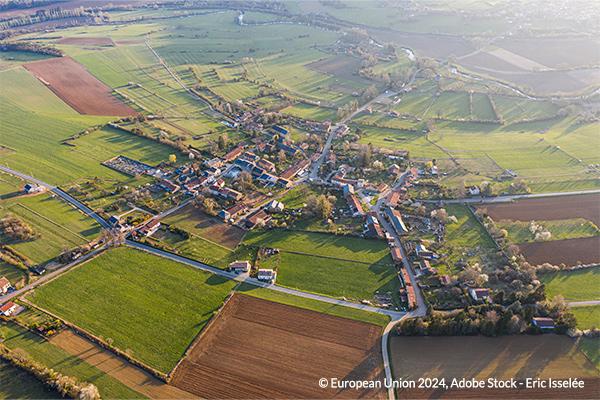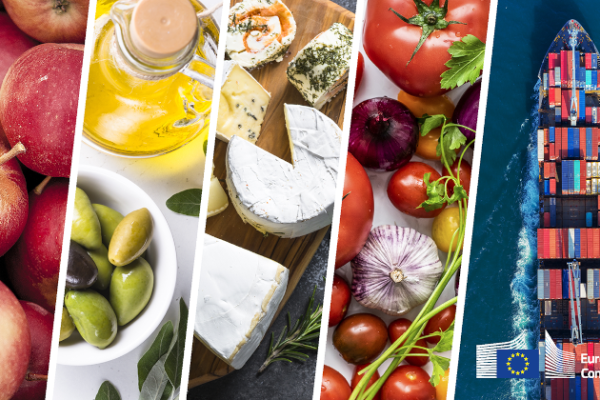How measures are applied
When designing their rural development programmes (RDPs), EU countries may apply funding from the European fund for rural development (EAFRD) through a number of measures.
Countries choose from twenty broad measures, which are further broken down into more specific sub-measures. These measures can be directed towards one or more of the EAFRD’s priority areas. In their RDPs, EU countries must indicate which measures they have used and how they will contribute towards the priorities of the EAFRD.
List of measures and sub-measures
- Knowledge transfer and information
- vocational training and skills acquisition actions (code: 1.1)
- demonstration activities and information actions (code: 1.2)
- short-term farm and forest management exchange as well as farm and forest visits (code: 1.3)
- Advisory services, farm management and relief services
- to help benefiting from the use of advisory services (code: 2.1)
- the setting up of farm management, farm relief and farm advisory services as well as forestry advisory services (code: 2.2)
- training of advisors (code: 2.3)
- Quality schemes for agriproducts and foodstuffs
- new participation in quality schemes (code: 3.1)
- information and promotion activities implemented by groups of producers in the internal market (code: 3.2)
- Investments in physical assets
- investments in agricultural holdings (code: 4.1)
- investments in processing/marketing and/or development of agricultural products (code: 4.2)
- investments in infrastructure related to development, modernisation or adaptation of agriculture and forestry (code: 4.3)
- non-productive investments linked to the achievement of agri-environment-climate objectives (code: 4.4)
- Natural disasters: restoring production potential and preventing damage
- investments in preventive actions to reduce the consequences of natural disasters, adverse climatic events and catastrophies (code: 5.1)
- investments to restore agricultural land and production potential damaged by natural disasters, adverse climatic events and catastrophies (code: 5.2)
- Farm and business development
- business start up aid for young farmers (code: 6.1)
- business start up aid for non-agricultural activities in rural areas (code: 6.2)
- business start up aid for the development of small farms (code: 6.3)
- investments in creation and development of non-agricultural activities (code: 6.4)
- payments for farmers eligible for the small farmers scheme who permanently transfer their holding to another farmer (code: 6.5)
- Basic services and village renewal in rural areas
- drawing up and updating plans for the development of municipalities and villages in rural areas and their basic services and of protection and management plans relating to Natura 2000 sites and other areas of high nature value (code: 7.1)
- investments in creation, improvement or expansion of all types of small scale infrastructure, including investments in renewable energy and energy saving (code: 7.2)
- broadband infrastructure, including creation, improvement and expansion, passive infrastructure and access to broadband and public e-government (code: 7.3)
- investments in setting-up, improving or expanding local basic services for the rural population including leisure and culture, and related infrastructure (code: 7.4)
- investments for public use in recreational infrastructure, tourist information and small scale tourism infrastructure (code: 7.5)
- studies/investments for the maintenance, restoration and upgrading of the cultural and natural heritage of villages, rural landscapes and high nature value sites including related socioeconomic aspects and environmental awareness actions (code: 7.6)
- investments targeting the relocation of activities and conversion of buildings or other facilities located inside or close to rural settlements, to improve the quality of life or increase the environmental performance of the settlement (code: 7.7)
- Others (code: 7.8)
- Investments in forest area development and improvement of the viability of forests
- afforestation/creation of woodland (code: 8.1)
- establishment and maintenance of agro-forestry systems (code: 8.2)
- prevention of damage to forests from forest fires and natural disasters and catastrophic events (code: 8.3)
- restoration of damage to forests from forest fires and natural disasters and catastrophic events (code: 8.4)
- investments improving the resilience and environmental value of forest ecosystems (code: 8.5)
- investments in forestry technologies and in processing, mobilising and marketing of forest products (code: 8.6)
- Setting up of producer groups and organisations
- setting up of producer groups and organisations in the agriculture and forestry sectors (code: 9)
- Agri-environment-climate
- agri-environment-climate commitments (code: 10.1)
- conservation and sustainable use and development of genetic resources in agriculture (code: 10.2)
- Organic farming
- payment to convert to organic farming practices and methods (code: 11.1)
- payment to maintain organic farming practices and methods (code: 11.2)
- Natura 2000 and Water Framework Directive payments
- compensation payment for Natura 2000 agricultural areas (code: 12.1)
- compensation payment for Natura 2000 forest areas (code: 12.2)
- compensation payment for agricultural areas included in river basin management plans (code: 12.3)
- Payments to areas facing natural or other specific constraints
- compensation payment in mountain areas (code: 13.1)
- compensation payment for other areas facing significant natural constraints (code: 13.2)
- compensation payment to other areas affected by specific constraints (code: 13.3)
- Animal welfare
- payment for animal welfare (code: 14)
- Forest-environmental and climate services and forest conservation
- payment for forest-environmental and climate commitments (code: 15.1)
- the conservation and promotion of forest genetic resources (code: 15.2)
- Cooperation
- establishment and operation of operational groups of the EIP for agricultural productivity and sustainability (code: 16.1)
- pilot projects and for the development of new products, practices, processes and technologies (code: 16.2)
- cooperation among small operators organising joint work and sharing facilities and resources, and developing and marketing tourism (code: 16.3)
- horizontal and vertical cooperation among supply chain actors for the establishment and development of short supply chains and local markets and promotion activities in a local context relating to this development (code: 16.4)
- joint action undertaken to mitigate or adapt to climate change and joint approaches to environmental projects and ongoing environmental practices (code: 16.5)
- cooperation among supply chain actors for sustainable provision of biomass for food and energy production and industrial processes (code: 16.6)
- non-CLLD strategies (code: 16.7)
- drawing up of forest management plans or equivalent instruments (code: 16.8)
- diversification of farming activities into health care, social integration, community-supported agriculture and education about the environment and food (code: 16.9)
- Others (code: 16.10)
- Risk management
- crop, animal and plant insurance premium (code: 17.1)
- mutual funds for adverse climatic events, animal and plant diseases, pest infestations and environmental incidents (code: 17.2)
- income stabilisation tool (code: 17.3)
- Complementary direct payments for Croatia
- financing of complementary national direct payments for Croatia (code: 18)
- Support for LEADER local development (CLLD)
- preparatory support (code: 19.1)
- support for implementation of operations under the CLLD strategy (code: 19.2)
- preparation and implementation of cooperation activities of the local action group (code: 19.3)
- running costs and animation (code: 19.4 )
- Technical assistance
- technical assistance (other than NRN) (code: 20.1)
- support for establishing and operating the NRN (code: 20.2)
Measures in the future CAP
For the future CAP, which is due to be implemented from 1 January 2023, the Commission has proposed that EAFRD funding be applied through eight broad policy measures. By reducing the number of measures and broadening their scope, the Commission seeks to provide greater flexibility for EU countries to tailor policy interventions towards their specific needs.
The eight policy measures are:
- environmental, climate and other management commitments;
- natural or other area-specific constraints;
- area-specific disadvantages resulting from certain mandatory requirements;
- investments;
- installation of young farmers and rural business start-up;
- risk management tools;
- cooperation
- knowledge exchange and information.


